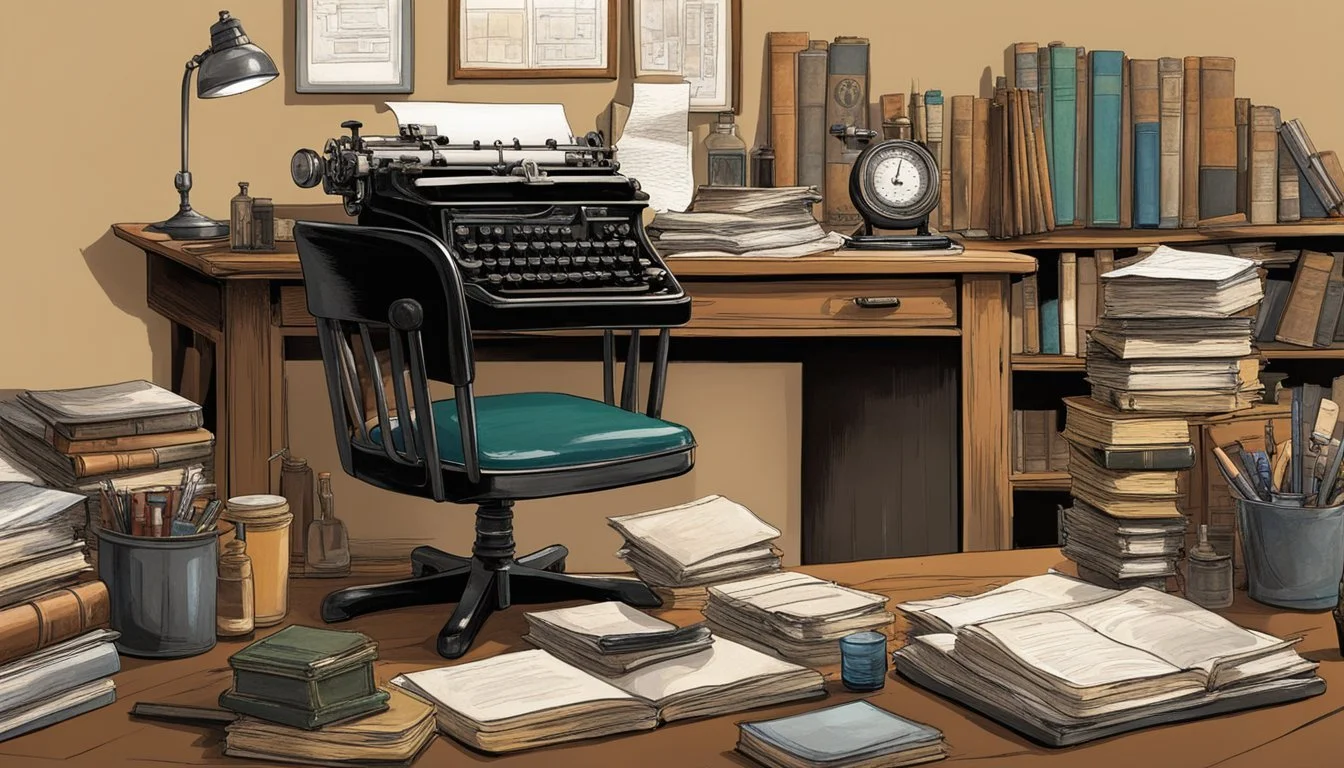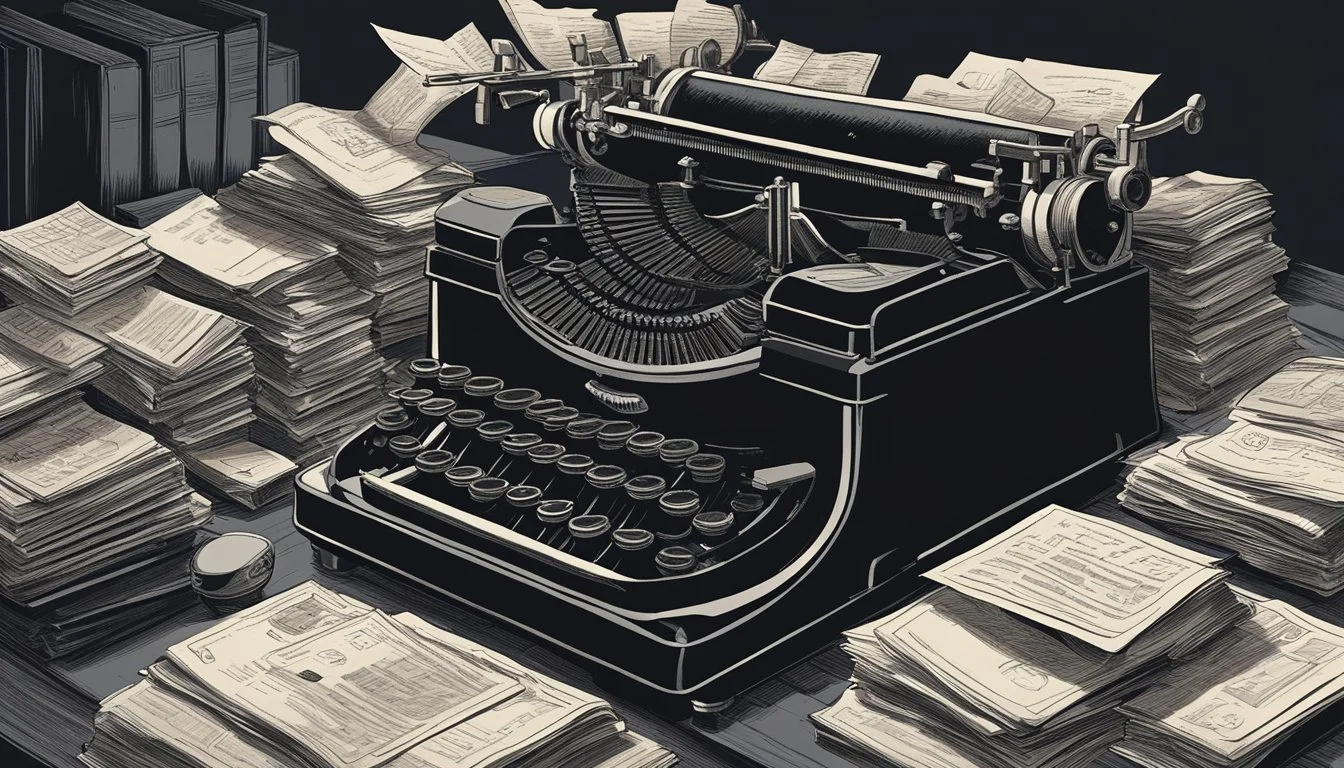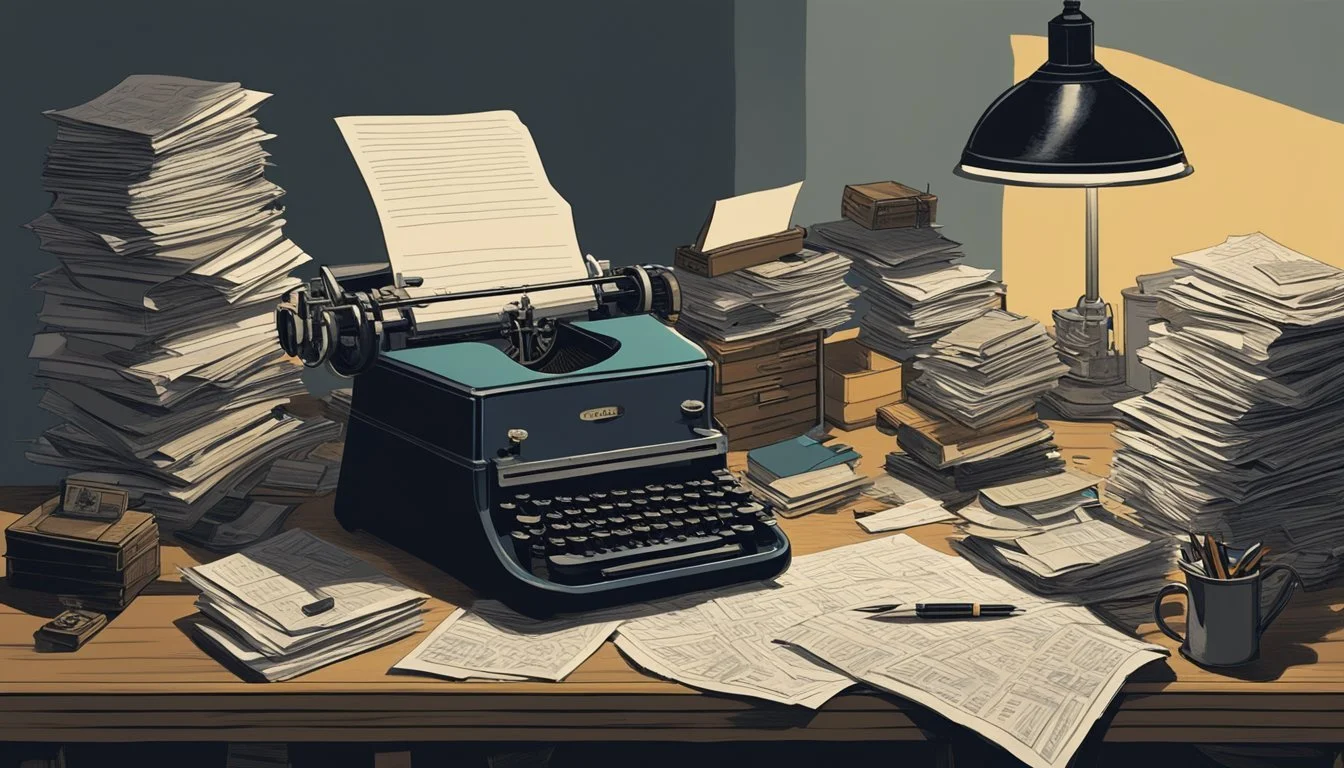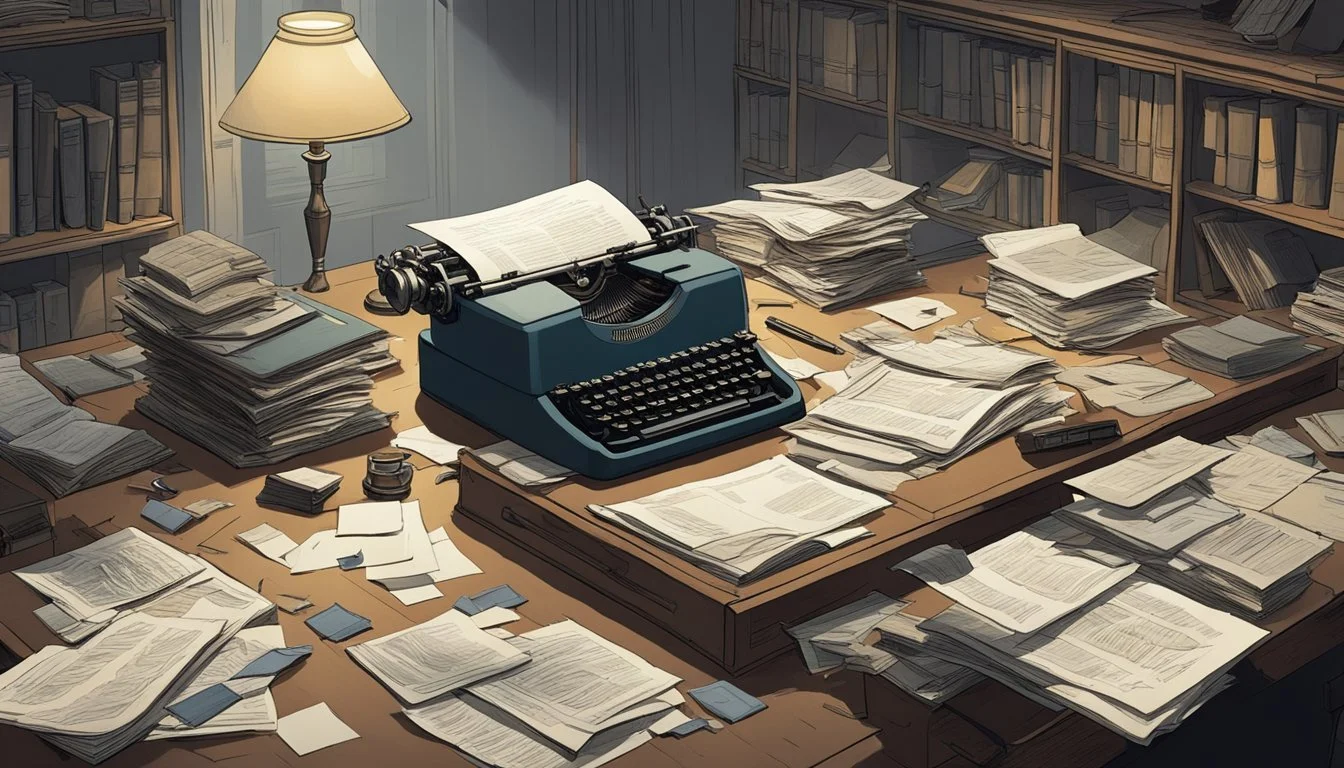Literary Forgery: Lee Israel's Real-Life Deceptions
Uncovering a Literary Con Artist's Schemes
Lee Israel, a once-successful biographer, turned to literary forgery in the 1990s as a desperate measure to overcome financial hardship. Her remarkable story of deception captivated audiences and became the subject of the film "Can You Ever Forgive Me?" starring Melissa McCarthy. Israel forged and sold approximately 400 letters purportedly written by famous literary figures, making her one of the most prolific literary forgers in history.
Israel's forgeries were so convincing that many experts were fooled. She meticulously researched her subjects, using period-appropriate paper and typewriters to create authentic-looking documents. Her talent for mimicking the writing styles of renowned authors allowed her to produce convincing fakes that fetched high prices from collectors and dealers.
The writer's foray into forgery began with a simple motivation - to pay for her sick cat's veterinary bills. However, it quickly escalated into a full-fledged criminal enterprise. Israel's story raises intriguing questions about the nature of authorship, the value of historical artifacts, and the lengths to which a person might go when faced with dire circumstances.
Lee Israel's Biography
Lee Israel was an American writer who gained notoriety for her literary forgeries. Her life journey took her from aspiring author to criminal forger, leaving a complex legacy in the literary world.
Early Life and Education
Lee Israel was born Leonore Carol Israel on December 3, 1939, in New York City. She grew up in a Jewish family in Brooklyn.
Israel attended Midwood High School before enrolling at Brooklyn College. She later transferred to Columbia University, where she earned her bachelor's degree.
Her early life was marked by academic pursuits and a growing interest in literature.
Literary Career and Struggles
Israel began her professional writing career at Scholastic Magazines. She later transitioned to freelance work, focusing on celebrity biographies.
Her first major success came with a well-received biography of actress Tallulah Bankhead in 1972. Israel followed this with books on journalist Dorothy Kilgallen and cosmetics tycoon Estée Lauder.
Despite initial success, Israel's career declined in the 1980s. Her book on Lauder received negative reviews, leading to financial difficulties.
Transition to Forgery
Facing mounting debts and an alcoholism problem, Israel turned to literary forgery in 1990. She began by selling authentic letters she had collected while researching her biographies.
When her supply of genuine letters ran out, Israel started forging documents. She created fake letters from literary figures like Dorothy Parker and Noël Coward.
Israel's forgeries were convincing enough to fool experts and collectors. She sold over 400 forged letters, earning thousands of dollars.
Arrest and Legal Consequences
Israel's criminal activities came to an end in 1993 when the FBI launched an investigation. She was arrested and pleaded guilty to conspiracy to transport stolen property.
Her sentence included six months of house arrest and five years of probation. Israel was also barred from many libraries and archives.
In 2008, Israel published her memoir "Can You Ever Forgive Me?", detailing her forgery escapades. She passed away on December 24, 2014, in New York City.
The Art of Forgery
Lee Israel's forgery scheme involved meticulous attention to detail and a deep understanding of literary figures. Her techniques allowed her to create convincing fake letters that fooled experts and collectors alike.
Crafting the Fake Letters
Israel's forgery process began with extensive research. She immersed herself in the works and correspondence of her chosen authors, studying their writing styles, quirks, and signature traits. Israel focused on creating letters from notable figures like Dorothy Parker, Noël Coward, and Tallulah Bankhead.
She paid close attention to the content, ensuring it aligned with known facts about the authors' lives and relationships. Israel often included witty remarks or personal anecdotes that seemed plausible for the supposed writer.
The forger also mastered the art of crafting credible backstories for her fake letters, explaining their provenance and how they came to be in her possession.
The Typewriters and Vintage Paper
To achieve authenticity, Israel used period-appropriate typewriters for each forged letter. She scoured thrift stores and antique shops to find models that matched those used by her chosen authors.
Israel also sourced vintage paper to match the era of her forged letters. She frequented used bookstores, carefully removing blank pages from old books. This attention to detail extended to selecting appropriate letterheads and stationery.
She even developed techniques to age the paper, such as soaking it in tea or exposing it to sunlight. These methods helped create the illusion of decades-old documents.
Mimicking the Voices of Historical Figures
Israel's skill in capturing the unique voices of literary figures was crucial to her forgeries' success. She studied their published works, letters, and interviews to internalize their writing styles.
For Dorothy Parker, Israel emulated her sharp wit and sardonic humor. When forging Noël Coward's letters, she mimicked his sophisticated tone and theatrical flair.
Israel paid attention to specific phrases, vocabulary choices, and sentence structures favored by each author. She also considered the historical context and personal circumstances of the supposed letter-writer at the time.
Sale and Distribution of Forged Letters
Israel initially sold her forged letters through reputable dealers and auction houses. She carefully built relationships with these intermediaries, establishing herself as a legitimate source of rare literary documents.
As suspicions grew, Israel turned to an accomplice, Jack Hock, to help sell her forgeries. They targeted smaller dealers and collectors who might be less likely to scrutinize the letters' authenticity.
Israel also stole authentic letters from libraries and archives, replacing them with her forged copies. She sold the originals, further blurring the line between genuine and fake documents in the literary marketplace.
Key Accomplices and Relationships
Lee Israel's forgery operation involved collaborators and business connections that enabled her criminal enterprise. Her primary accomplice was Jack Hock, while various dealers and collectors unknowingly participated in the scheme.
Jack Hock and Collaboration
Jack Hock played a crucial role in Israel's forgery operation. A flamboyant ex-convict and drug dealer, Hock became Israel's friend and partner in crime. He helped sell her forged letters to unsuspecting dealers when Israel herself was banned from many shops.
Their collaboration began in 1991 and lasted for several months. Hock's charm and salesmanship complemented Israel's forgery skills. Together, they successfully sold numerous fake literary letters.
However, their partnership was short-lived. Israel eventually discovered Hock was cheating her out of profits. This betrayal led to the end of their criminal alliance.
Dealers and Collectors
Autograph dealers and collectors were unwitting participants in Israel's scheme. Many reputable shops and individuals purchased her forged letters, believing them to be genuine.
Israel targeted specific dealers known for their interest in literary memorabilia. She crafted her forgeries to appeal to their preferences and expectations.
Some dealers became suspicious over time, noticing similarities in handwriting or paper across different authors. This growing skepticism eventually led to increased scrutiny of Israel's offerings.
Collectors who purchased the forged letters often did so through these dealers. Many were passionate about owning pieces of literary history, making them vulnerable to Israel's deceptions.
Criminal Investigation and Fallout
Lee Israel's forgery scheme eventually caught the attention of law enforcement. Her crimes had significant repercussions for both herself and the literary community.
The Role of FBI and Authorities
The FBI launched an investigation into Lee Israel's forgeries in 1992. Agents tracked her activities and gathered evidence of her crimes. Israel's apartment in Manhattan was searched, revealing forged documents and typewriters used in her scheme.
The authorities uncovered over 400 forged letters. Israel faced charges of conspiracy to transport stolen property across state lines. She pleaded guilty in 1993 to avoid a lengthy trial.
Impact on the Literary and Collectors' Community
Israel's forgeries caused turmoil in the rare document market. Autograph dealers and collectors questioned the authenticity of items they had purchased. Many valuable pieces were revealed to be fakes.
Libraries and archives implemented stricter verification processes for donated materials. The scandal highlighted vulnerabilities in authentication methods. Some collectors suffered financial losses from unknowingly acquiring forged documents.
Israel's crimes eroded trust within the literary community. Her actions prompted increased scrutiny of historical documents and correspondence. The incident served as a cautionary tale about the potential for fraud in the rare book and manuscript trade.
Media Representations and Legacy
Lee Israel's story of literary forgery captured public imagination, leading to various media portrayals. Her tale transitioned from a personal memoir to a critically acclaimed film, bringing renewed attention to her crimes and life.
The Memoir 'Can You Ever Forgive Me?'
Lee Israel published her memoir "Can You Ever Forgive Me?" in 2008. The book detailed her experiences as a literary forger, providing insight into her motivations and methods. It received positive reviews for its candid portrayal of Israel's criminal activities.
The memoir shed light on Israel's fall from grace as a once-successful celebrity biographer. It chronicled her descent into forgery, initially to pay for her cat's veterinary bills. The book's frank tone and insider perspective on the world of literary memorabilia made it a compelling read.
Film Adaptation and Portrayal by Melissa McCarthy
In 2018, Israel's memoir was adapted into a film starring Melissa McCarthy as Lee Israel. Directed by Marielle Heller, the movie received critical acclaim and multiple award nominations. McCarthy's portrayal earned her an Academy Award nomination for Best Actress.
The film explored Israel's life as a struggling author and her entry into forgery. It depicted her relationship with Jack Hock, played by Richard E. Grant, who assisted in selling the forged letters. McCarthy's performance was praised for its nuanced portrayal of Israel's complex character.
"Can You Ever Forgive Me?" brought Israel's story to a wider audience, sparking discussions about authenticity in the literary world. The film's success renewed interest in Israel's original memoir and the ethical questions surrounding literary forgery.
Analysis of Lee Israel's Impact
Lee Israel's literary forgeries left a lasting mark on the collectibles market and raised important ethical questions about authenticity in literature.
Ethical Considerations in Literary Forgery
Lee Israel's actions blurred the line between creativity and criminal activity. Her forgeries demonstrated remarkable skill in mimicking the writing styles of famous authors. This talent, while impressive, was ultimately used for deception.
Israel's motivations stemmed from financial desperation and a desire for recognition. Her actions highlight the struggles some writers face in a competitive industry.
The case prompts reflection on the nature of authorship and originality in literature. It raises questions about the value placed on celebrity signatures versus the content itself.
Authenticity and Value in the Collectibles Market
Israel's forgeries exposed vulnerabilities in the authentication processes for literary memorabilia. Her ability to fool experts using vintage paper and typewriters revealed flaws in verification methods.
The discovery of her fakes led to increased scrutiny and improved authentication techniques. This resulted in a more cautious approach to valuing and purchasing literary collectibles.
Israel's actions temporarily inflated the market with fake items, potentially harming genuine collectors and sellers. However, her case also heightened awareness about the importance of provenance in determining an item's worth.
The incident underscored the complex relationship between scarcity, authenticity, and perceived value in the collectibles market.






